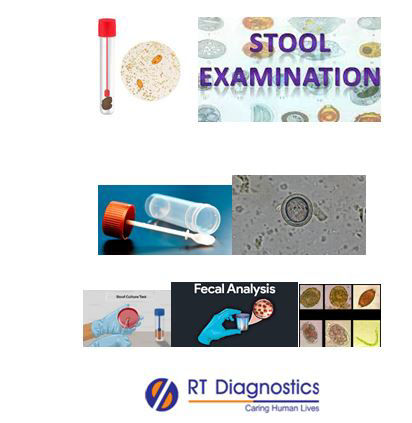Faeces Examination:
Why Feces Examination Test?
CLINICAL INFORMATION
A stool or faeces examination is also known as an enteric sample specimen analysis. It comprises of a series of tests. These tests when performed helps to diagnose certain conditions affecting the GIT (mainly the lower GI abnormalities) – such as Infection and/or parasitic infestations (parasites like protozoan -trophozoites and cysts, viruses, bacteria like C. difficile, Campylobacter, E.coli, Salmonella, Shigella, Plesiomonas, vibrio etc), Mal-absorption eg Celiac disease, IBD like Ulcerative colitis, Hemorrhoids, Polyps, Cancer, Pancreatitis (fatty stools - Steatorrhea) etc. A faeces or a stool test is ordered by a physician in case of certain indications with signs and symptoms (clinical manifestations) including diarrhoea, stool with mucus or blood, stomach cramping, nausea, vomiting fever etc. Stool culture and sensitivity tests are also performed to detect the presence of disease-causing harmful microbes in sample specimens of suspected patients. Moreover, stool may be tested for the presence of parasites, spores, ova (egg of the parasite) and also roundworm, flat worm, hookworm, tapeworm etc, under the microscope – by a routine microscopic study. A normal routine stool test is also performed to examine for occult blood loss in faeces, bile water stools, WBCs in infections (in colon or rectum), sugars etc (these faecal sample specimens are used as a tool of evidence for certain abnormal (medical) conditions, for example -in systemic manifestations like sepsis; but particularly when it is mediated with the GIT diseases/disorders etc). This test result may vary depending on the age, gender (sex), health history, type of tests conducted for diagnosis, travel history (Vibrio species, Escheria coli, Yersinia entercolitica, Pleisomonas, Aeromonas, Entamoeba histolytica etc). Moreover, this test helps the physician to diagnose the harmful microbial pathogens present in the intestine (enteric pathogen) eg.botulism – in case of food poison. The cause includes consuming the contaminated food or water (food or waterborne illness) infected with harmful microbes, parasites etc. Risk factors for gastro-enteritis related diseases include consuming contaminated water or food, raw or undercooked eggs, poultry or beef, unpasteurized milk, weakened immune system and/or immuno-compromised patients with immunosuppressive medication etc. Therefore a stool culture test helps detect to diagnose specific enteric pathogens eg. typhoid fever, enteric fever, bacillary dysentery, salmonella infection etc. Complications due to untreated chronic enteric infections can lead to severe symptoms of dehydration, electrolyte imbalance etc. Additional tests include isolation in cell culture, WBCs – Differential count, Calprotectin test, faecal immunochemical tests / Antigen tests eg. Yersinia test, Giardia test, Salmonella culture test, Cryptosporidium test, Test for Entamoeba hystolytica, Test for the presence of taeniasis etc. Other additional tests include CBC, CRP and ESR (inflammation), widal test, microscopic examination for gram stain, other stool tests to examine egg, cyst, ova, spores, parasites test for bacterial toxins, viral antigen stool test, Clostridium difficile test – toxin, shiga like toxin test by enzyme immunoassay, trypsin/chymotrypsin test, Campylobacter culture test, H.pylori antigen test, urine culture, abdominal ultrasound, abdominal CT Scan, contrast enema X-ray, PCR etc. Hence from all possible differential diagnoses, these tests help physicians to establish a confirmative definitive diagnosis.

General Instructions:
Sample Requirement: Specimen – Fresh Stool. Test Preparation: None.
NOTE - Sample for specimen collections may vary based on the patient’s condition/cases according to the patient’s presenting complaints/signs or symptoms:
SPECIMEN REQUIREMENT (Special or Rare Cases) - As instructed and guided by Physician / Clinician / Pathologist / as per Laboratory’s requirements, according to procedures and protocols.
This Multi-Specialty Clinical Referral Laboratory RTDIAGNOSTICS provides precise and accurate tests with an extensive range of testing services to the medical centres to help in the diagnosis and identification of pathology in the test specimens for infectious diseases and also to evaluate the function of organ systems of the patient. It prevents further complications and helps to stabilize and restore health to near normalcy at the earliest without delay.



